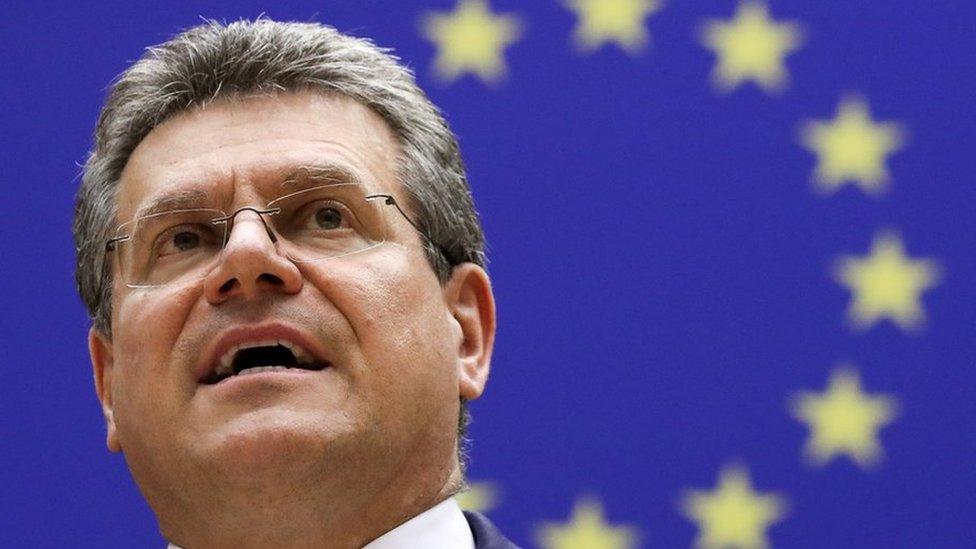NI Protocol: Irish Sea border ongoing despite order, says Downing St
- Published
- comments
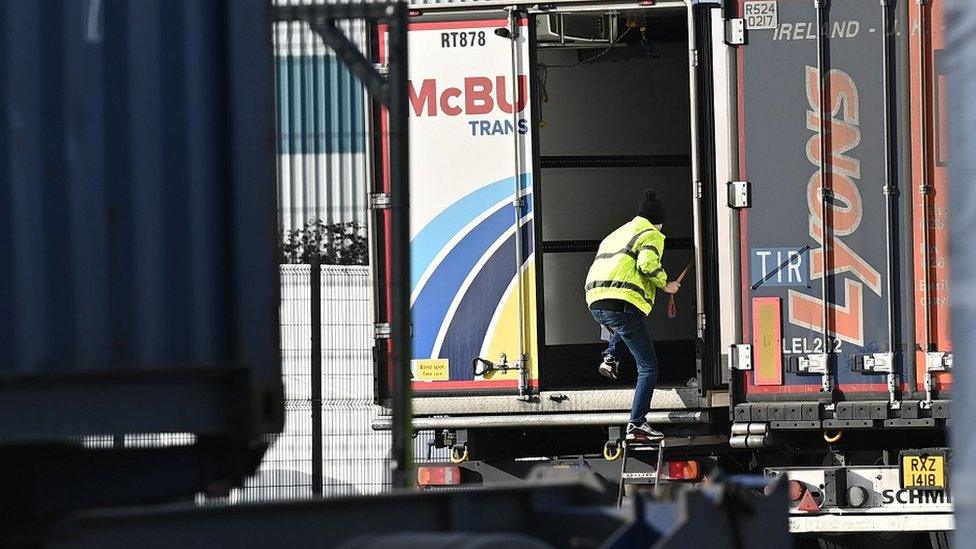
Checks are continuing on goods along the Irish Sea border despite an order by a Democratic Unionist Party minister for them to stop, Downing Street has said.
Northern Ireland's Agriculture Minister Edwin Poots had ordered checks to stop from 00:01 GMT.
But the prime minister's spokesman said checks were continuing, and that "we are reviewing the legal position".
Mr Poots has said he made the move after receiving legal advice.
Sinn Féin, the DUP's power-sharing partners, criticised the move to halt port checks as a "stunt".
The order is part of the DUP's ongoing opposition to the Northern Ireland Protocol.
First Minister Paul Givan announced his resignation later as part of that protest.
Inspections of products from Great Britain into Northern Ireland are part of the post-Brexit protocol agreement.
It was agreed by the UK and EU to ensure free movement of trade across the Irish border after Brexit.
Under the deal, checks on goods from Great Britain must take place at Northern Ireland's ports to ensure they comply with EU laws.
We certainly weren't aware - No 10
Prime Minister Boris Johnson said on Thursday that a "sensible solution" was needed to the protocol, which "recognises that it's crazy to have checks on goods that are basically circulating within the single market of the UK".
Earlier, Mr Johnson's spokesman said checks were "a matter for the Northern Ireland Executive", adding "we would like to see this situation resolved".
Asked whether the prime minister viewed the checks as the UK's obligation under the protocol, he said "we are reviewing the legal position" and said the government wanted to find "solutions" through ongoing negotiations with the EU.
The environment secretary George Eustice is expected to make a statement in the House of Commons later, after speaking with Mr Poots.
The spokesman said the prime minister wanted checks to continue and had not been informed of the decision to suspend them until the announcement was made, adding: "We certainly weren't aware this was an approach the DUP would take."
Asked about reports that Mr Givan will resign as Northern Ireland's first minister and the possible return of powers to Westminster if Stormont collapsed, he said the government wanted to see a "resilient" and "stable power-sharing executive".
Why are border checks controversial?
Unionist politicians have criticised the arrangements, saying they damage Northern Ireland's place in the UK.
Simon Coveney, the Irish Republic's foreign minister, has warned that an end to those checks would breach international law.
However, the UK government said it would not interfere and that the issue was a "matter for the Northern Ireland Executive".
The dispute over the protocol checks centres on whether Mr Poots needs the wider authority of Stormont to act.
Mr Poots, who is the Stormont Executive's agriculture minister, said legal advice supported his view that he was entitled to order officials to stop.
On Thursday he confirmed that the legal advice came from former Northern Ireland attorney general John Larkin, but also said he had also been receiving advice from the current attorney general Brenda King.
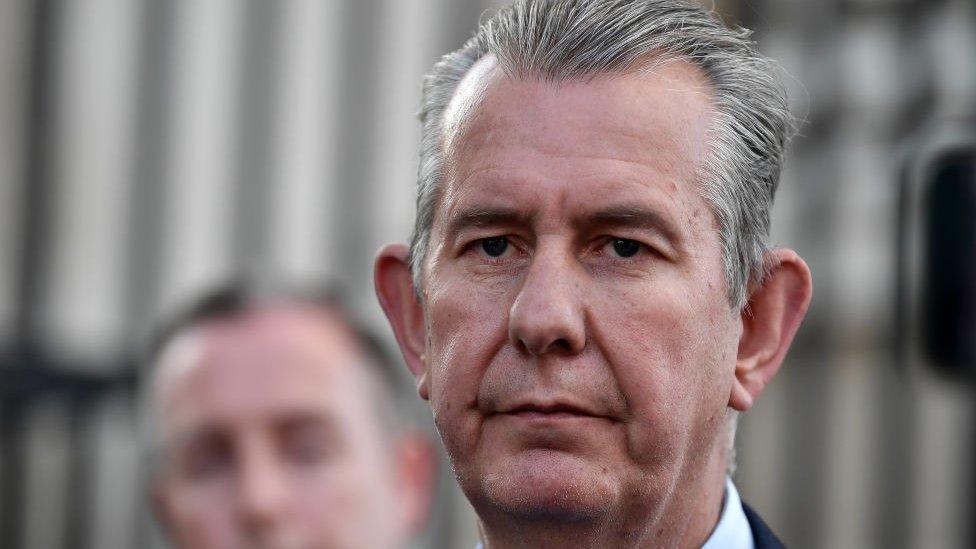
Edwin Poots, Northern Ireland's agricultural minister, believes the Irish Sea checks are unlawful
Under power-sharing arrangements, if a matter was put to the executive, it would need an agreed approach from both the first and deputy first minister for changes to be made.
DUP MP Sammy Wilson said the move was a "test" to see if border checks were necessary, and a "kick to get reality into talks" over the protocol.
But Sinn Féin MLA John O'Dowd said Mr Poots announcement was a "stunt".
Mr O'Dowd said Sinn Féin would "use whatever powers we have at our disposal to ensure that the protocol remains in place".
Ulster Unionist Party (UUP) leader Doug Beattie, whose party opposes the protocol, said the Irish Sea border loomed as large as it did before Mr Poots stopped some checks.
"HMRC are still doing their checks, border force are still there. The checks are not stopped."
He told BBC NI's The Nolan Show: "What we're trying to do is trying to get rid of the Irish Sea Border, and you'll get rid of the Irish Sea Border through negotiation."
What is happening at Northern Ireland's ports?
For now, some checks appear to be continuing. However, even in the light of Edwin Poots' order, pre-Brexit checks on livestock are expected to continue as normal.
Belfast City Council, which employs staff at the port's border control post, said it will "engage with representatives and statutory partners" on Thursday and "assess the situation at that point".

At the port: Sara Neill, BBC News NI reporter
As the sun rises at Duncrue Street in Belfast, there's no further light shed on what's happening behind the checkpoint fence.
Staff in hi-vis jackets are on the ground.
I watched one lorry stop, its back doors open, and a member of staff appeared to be looking at what was inside.
It then left the facility, seemingly following an official-looking 4x4.
Another lorry has just pulled up inside the checkpoint. Several members of staff are around it. Again it looks like something is being checked but at this point it's just not clear what.
The next ferry is due to arrive in Belfast just before 10am.

Seamus Leheny from Logistics UK said the directive had left hauliers in a legal limbo, but that most businesses would carry on as they had before.
Mr Poots' announcement applies only to animal, food and plant products - Mr Leheny said the vast minority, only about 3%, of lorries which arrive at Belfast Port will have to open their doors for their goods to be checked.
About 12% just need their documents checked, and the rest need no checks at all.
He said things were "up in the air".
"The legal text hasn't changed - this is the situation businesses find themselves in, is that the legality side of things says one thing, the practical assessment of those checks has been instructed in another way."

Aodhán Connolly, director of the NI Retail Consortium, said he did not have "clarity" on whether the checks on goods had stopped.
"For retailers and for any business, it's not what we can get away with, but what's the safest course of action to minimise the chance that our products will get caught up in some regulatory or legal problem."
He added: "What business has always needed is stability, certainty, simplicity and affordability, now short-term solutions of removing checks don't get us to that long-term solution which removes that friction from Great Britain to Northern Ireland."


There is now a tense wait to see what happens next.
First, will checks actually be stopped? Both Downing Street and the European Commission say that checks are still going on.
A second question is, if those checks did stop - what would be the consequences?
The UK is suggesting that this is a matter for the Northern Ireland Executive. That won't wash with the EU who point out that the protocol is an agreement between Brussels and the UK government.
If the European Commission believes the agreement is being breached, it's conceivable it could take legal action.
But we're not there yet and, as things stand, the Commission says it won't "speculate".
Everyone is aware that this is a difficult and delicate situation.
Suddenly an already scheduled call between the Foreign Secretary Liz Truss and Commission Vice-President Maroš Šefčovič has gained a whole new significance.

Northern Ireland Deputy First Minister Michelle O'Neill, of Sinn Féin, said the move was an attempt by the DUP to "unlawfully interfere with domestic and international law".
Her party maintains that Stormont has a legal obligation to enforce the checks, and that the executive agreed in May 2020 to designate Mr Poots' department to perform those controls.
But Mr Poots believes the checks are unlawful and cannot continue without approval from the Stormont Executive.
Last week, his attempt to force an executive rethink on the issue was blocked by Sinn Féin.
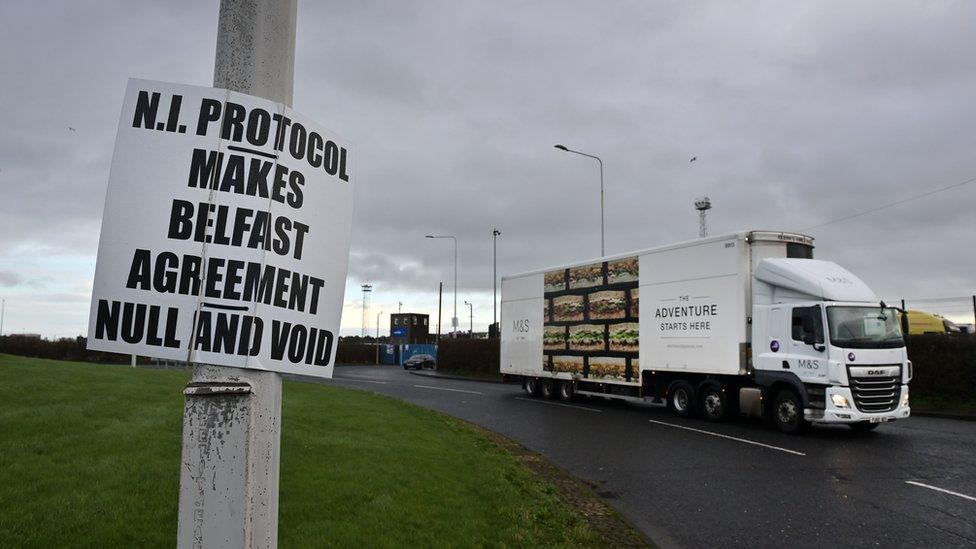
Unionists have been critical of the Protocol, saying its damaging Northern Ireland's place in the UK
Mr Poots had sought executive support for the checks continuing, ahead of a legal challenge by loyalist blogger Jamie Bryson.
The DUP minister argued the challenge made clear that checks must be approved by all ministers as they are controversial and cut across various departments.
The BBC has contacted the UK's Department for Environment, Food & Rural Affairs for a response.
The Manufacturing NI trade body said it was advising members to continue to enact the measures.
Allow X content?
This article contains content provided by X. We ask for your permission before anything is loaded, as they may be using cookies and other technologies. You may want to read X’s cookie policy, external and privacy policy, external before accepting. To view this content choose ‘accept and continue’.
Political reaction
Foreign Secretary Liz Truss is expected to speak to EU Commission Vice-President Maroš Šefčovič when they meet on Thursday.
Northern Ireland Secretary Brandon Lewis said there was no orchestration between the government and the DUP over Mr Poots' decision.
Speaking to ITV's Robert Peston, he said he first found out about the move when Mr Poots announced it, adding that the decision was a "matter for the Northern Ireland Executive" and "within their legal remit".
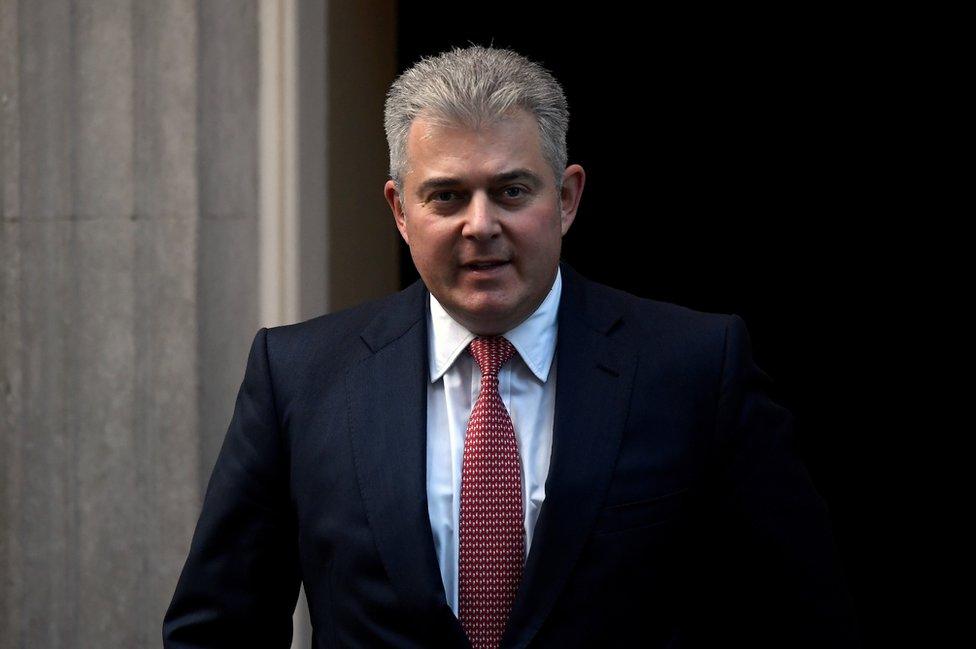
Brandon Lewis said he had no prior warning of Mr Poots' announcement
Irish Foreign Minister Simon Coveney described moves to "deliberately frustrate obligations" under the post-Brexit agreement as a "very serious matter ".
An EU diplomat told BBC News the move "won't do the UK's reputation any good" and questioned the decision's legality.
The Alliance Party's John Blair said it was "not a time for causing further disruption", adding that his party would consider "very carefully" before deciding on any legal challenge.
Matthew O'Toole, the SDLP's Brexit spokesperson, said the order was "outrageous" and that the public was more concerned with other matters, adding it would "not command the support of the assembly or the executive" and would be challenged.
However, the move was welcomed by Traditional Unionist Voice (TUV) leader Jim Allister, who said the protocol's implementation was "never compatible" with Northern Ireland's position within the UK.
Related topics
- Published27 January 2022
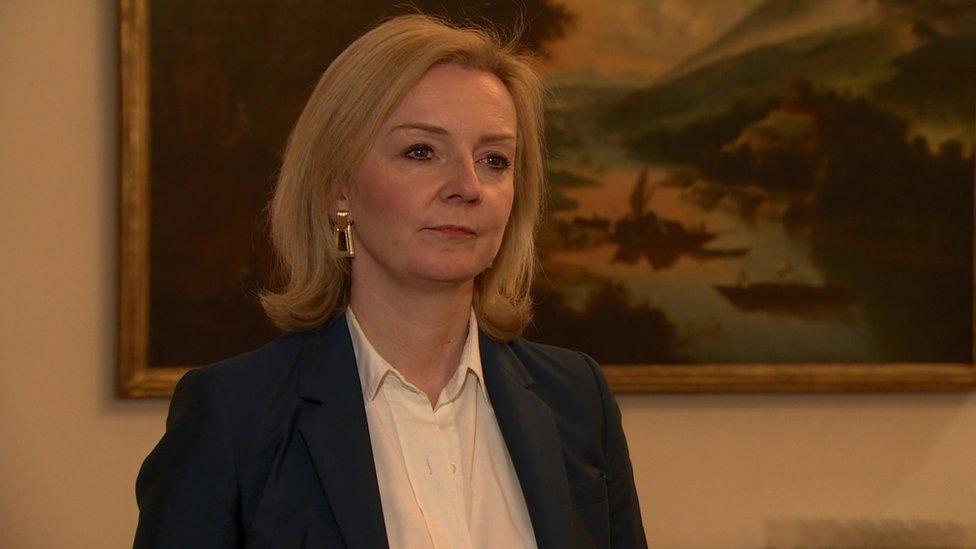
- Published26 January 2022
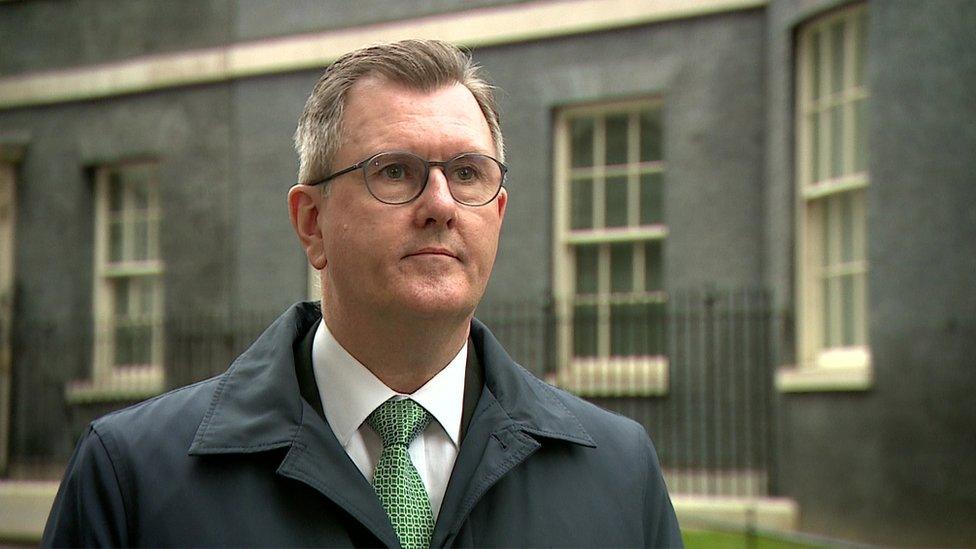
- Published24 January 2022
